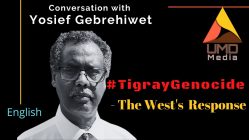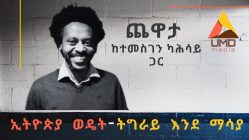Zerayacob Gebrehiwet
It is impossible to rule out that Abiy Ahmed might attempt to use factions of the Tigray People’s Liberation Front (TPLF) or any willing entity as a Trojan horse to dismantle the TPLF and assert his influence over Tigray. However, for those who view the TPLF as a burden on Tigray, its weakening, provided it does not invite external domination, would be a net positive.
Some misconstrue the argument, believing that the case for weakening the TPLF hinges on proving that Abiy Ahmed’s governance would be an improvement. This is a false premise. The argument instead rests on demonstrating that the TPLF’s continued dominance is fundamentally detrimental to Tigray, an obstacle to its survival, recovery, and political renewal.
The TPLF Has Led Tigray to Ruin
For decades, the TPLF ruled Tigray without meaningful opposition, and this unchallenged power has led to catastrophe. Under its leadership, Tigray entered a devastating war that resulted in over a million deaths, millions displaced, and the region’s economy in ruins. This disaster is the work of an external enemy. It is also the product of the TPLF’s political miscalculations and confrontational stance.
Even before the war, the TPLF failed to build a self-sufficient economy. Despite its prolonged rule, Tigray remained heavily dependent on external aid. The party also suppressed opposition and alternative leadership, ensuring that no credible political future existed beyond itself. Now, after the war, the TPLF lacks a serious idea of a reconstruction plan, a strategy for economic stability, or a vision for governance beyond clinging to power.
A party that repeatedly leads its people into destruction cannot be considered essential to their survival. Its continued dominance does not guarantee security—it guarantees more war, more suffering, and more political stagnation.
The “Better Alternative” Fallacy
Those advocating for the TPLF’s removal are not required to prove that Abiy Ahmed would be a better ruler—this is a false standard. If the TPLF is actively harming its people, opposing it is justifiable, even if the alternative remains uncertain. There is no need to demonstrate that Abiy Ahmed is a better leader to justify the removal of a party that has failed on every level.
History provides numerous examples. The collapse of the Soviet Union was not celebrated because Russia had a perfect democracy waiting, it was welcomed because the Soviet system was beyond repair. Apartheid in South Africa was opposed not because a flawless post-apartheid government was assured, but because apartheid was untenable. Across the world, authoritarian regimes have been overthrown not because their replacements were guaranteed to be better, but because continuing under them was no longer an option.
Tigray is not faced with a binary choice between the TPLF and Abiy Ahmed. It is faced with a choice between continued suffering under the TPLF and the possibility of something different. As long as the TPLF remains dominant, no meaningful political alternative can emerge.
Abiy Ahmed’s Genocidal Crimes Must Never Be Forgotten
None of this suggests that Abiy Ahmed is a savior. On the contrary, his government, in collaboration with Eritrean forces and Amhara regional militias, has committed genocide, ethnic cleansing, mass starvation, and systematic sexual violence against the people of Tigray. These crimes must never be dismissed or forgotten.
However, acknowledging Abiy’s atrocities does not mean the TPLF must remain in power. The suffering of Tigray must not be weaponized to justify the indefinite rule of a failed party. The TPLF’s survival should not come at the cost of political renewal and recovery.
If the TPLF truly acts in Tigray’s best interests, why has it failed to facilitate any serious political alternative? Why has it not paved the way for governance beyond itself? Why does it continue to equate its survival with Tigray’s survival?
Tigray’s Future Requires Breaking Free from the TPLF’s Grip
The notion that weakening or removing the TPLF is bad for Tigray ignores a fundamental truth: the TPLF itself has no viable future plan. It remains locked in a war-first mentality, unable to pivot toward diplomacy, economic recovery, or governance renewal.
Even if Abiy’s intentions are dangerous, that does not mean the TPLF is the only alternative. As long as the TPLF monopolizes political space, Tigray will never rebuild. A weakened TPLF creates room for new leadership, leaders not tied to past failures. It compels Tigray to move beyond warlord-style governance and toward a new political framework.
Change will not come if Tigray remains trapped under the TPLF’s control. The party’s dominance prevents the emergence of a new political order that prioritizes diplomacy, development, and stability over perpetual conflict.
The Case for Change
Those who argue for keeping the TPLF intact do so out of fear, fear that Abiy Ahmed will exploit the party’s weakness. But fear is not a political strategy. Tigray cannot cling to a failed leadership merely because it fears the alternative. The real debate is not about whether Abiy Ahmed’s motives are pure. The real debate is whether Tigray can afford to remain under a political force that has repeatedly led it to disaster. Waiting for a perfect alternative before demanding change is a recipe for stagnation and continued suffering.
The TPLF’s continued dominance is not a safeguard for Tigray, it is an obstacle to its survival and recovery. Tigray needs new leadership, fresh strategies, and a revitalized political culture. The first step toward that transformation is the weakening of the force that has brought it to ruin.
Editor’s Note: The opinions expressed in the articles published on UMD Media are solely those of the individual authors and do not necessarily reflect the views or opinions of the editorial team or UMD Media as an organization. The publication of any opinion piece does not imply endorsement or agreement by UMD Media. Readers are encouraged to critically evaluate the content and form their own conclusions. Leave your comments below. Send us your thoughts and reflections to umd.media.2020 at gmail dot com.



